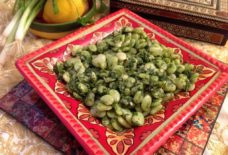Arab American Comics Aim to Get the Last Laugh
A billboard outside Gotham Comedy Club in Chelsea, announcing the 13th annual Arab-American Comedy Festival.
By Courtney Vinopal
NY City Lens
This presidential election year has been a tense one for the Arab community in the United States. Terrorist attacks carried out by extremists from Paris to San Bernardino have directed the public’s eye— and the political conversation— toward Arab communities both in the United States and abroad. Presidential Republican nominee Donald Trump has stirred sentiment against many growing immigrant communities in the United States too —and Arab-Americans — particularly Muslims — have been a significant target.
It can be hard to find humor about such matters during a contentious political moment. But on the evening of Saturday, October 1, Arab-American comedians from around the United States gathered at Gotham Comedy Club in Chelsea to ensure that they would have the last laugh this election year.
“I don’t agree with Donald Trump as a presidential candidate…I don’t even agree with Trump as a human being,” said comedian and host Ramy Youssef, who opened the show with a bit about the presidential candidate. “That’s because he’s not a person — Donald Trump is a feeling. Like sometimes you’re upset, but sometimes you’re Donald Trump, and you’re just like… ‘Fuck China’…and you don’t know why, it just hits you!”
Youssef went on to mock Trump’s positions on everything from immigration to counterterrorism, which he said often elicit an emotional response from voters, but rarely represent practical solutions.
“It’s not logical, people are voting for a feeling,” Youssef joked.
The 13th edition of the festival — which was founded by Dean Obeidallah and a fellow Arab comedian, Maysoon Zayid, to showcase the talents of Arab-American comedians — was full of not-so-subtle references to the absurdities of politics in America as well as the experience of being Arab in the United States.
On stage, Zayid, a co-founder of the festival, joked about her strict upbringing New Jersey, where she was raised by her Palestinian parents.
“Arab girls don’t date, we get married,” festival co-founder Zyid joked. “I was a virgin by choice, and that was my father’s choice.”
The bit drew howling laughs and applause from the audience.
The U.S. Census Bureau estimates that there are around 1.5 million people of Arab ancestry currently living in America, a 76 percent increase since 1990. Today, some of the states with the largest Arab populations include not only California, Michigan, and New York, but also Texas and Florida, according to the Arab American Institute.
Although it has evolved over the years, humor has always had a place in Arab culture. Lyne Sneige, the director of the Arts and Culture at the Middle East Institute, said that Arab entertainers started using comedy as a way to question authority in the 1970s. When civilians began to revolt against oppressive regimes across the Middle East during the Arab Spring in 2011, comedy grew more political.
“With the Arab Spring came a more open and strong critique of the present situation and government,” she said.
Few topics were off limits during Saturday’s show, as the comedians riffed upon everything from the Islamic State’s sophisticated recruiting tactics to the ever-fraught relationship between Israel and Palestine. As Arab-Americans, the comedians were in a unique position to comment on such political issues.
Atheer Yacoub, a Palestenian-American comedian, spoke about being one of the only Arab students at her school in Birmingham, Alabama.
Atheer Yacoub, a Palestinian-American comedian, believes that during this particular election year, it is important for Arab-Americans to speak frankly about the issues affecting their community.
“I think [humor] is the best way to approach the hatred,” she said. “When you’re using humor, you can disarm people with it. Even through a joke, you can deliver a message that the audience wouldn’t hear otherwise.”
Ali Sultan, who is originally from Yemen, did just this during his standup bit. Using an anecdote about an accident at a gas station, he recounted a situation familiar to many Arab-American people in a post-9/11 world: being the target of suspicion. After he saw a woman drive off with a gasoline nozzle attached to her car, causing gas to spray everywhere, Sultan joked that people would immediately look to someone in the Arab community to blame.
“ISIS is claiming this tomorrow. They claim knife fights! Like I don’t ever get into bar fights because I’m afraid they’re going to claim it the next day. That’s how it works, they claim it and then we’re on Fox news the next day,” he said.
A sobering reality about the world today delivered amid fits of laughter. The humor resonated with many audience members, whether Arab-American or not.
Jamila Raqib, an executive director of a non-profit based in Boston, came to the show with her husband and his parents, who are Tunisian. They thought the comedians did a good job of making otherwise complex issues accessible to a diverse audience.
“It really pushed taboos,” she said. “These are not topics that get discussed all the time, but of course they’re part of life.”


